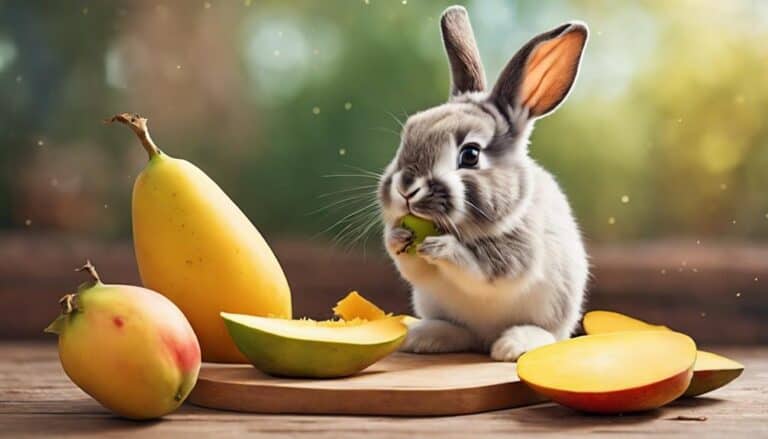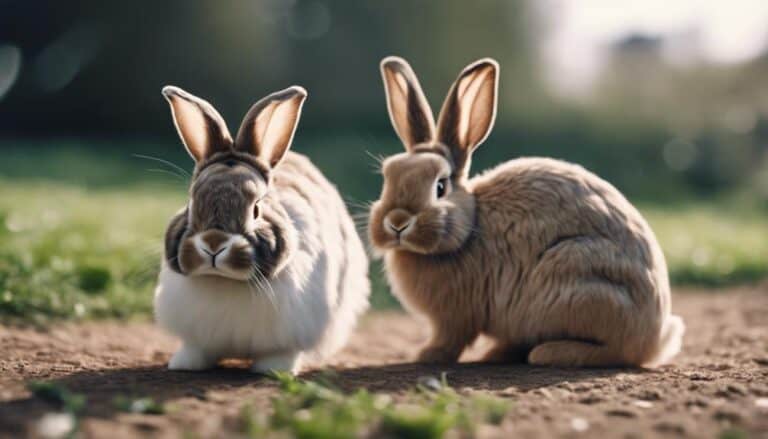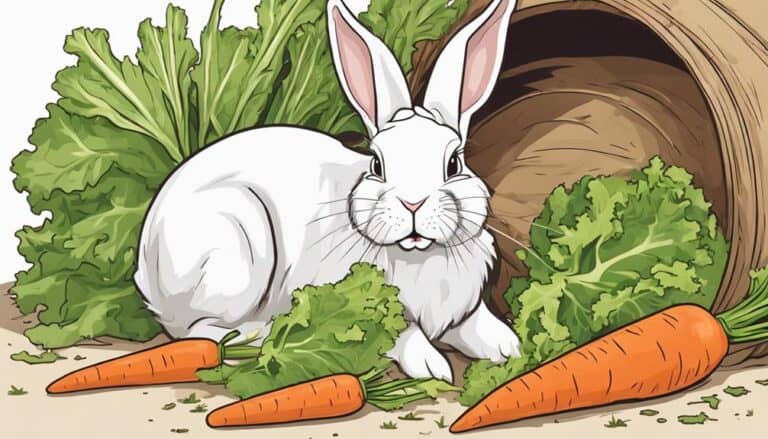Imagine a fluffy bunny nibbling on a sweet grape, a delightful sight indeed.
However, before you rush to offer this fruit to your furry friend, it's important to think about a few factors. While grapes can be a tasty addition to your bunny's diet, there are specific precautions you must take to make sure their well-being.
So, what exactly should you know before introducing grapes to your bunny's menu? Stay tuned to discover the dos and don'ts of feeding grapes to your hopping companion.
Contents
- 1 Key Takeaways
- 2 Safety of Grapes for Bunnies
- 3 Grape Parts Safe for Bunnies
- 4 Grapes' Benefits for Bunnies
- 5 Quantity of Grapes for Bunnies
- 6 Preparing Grapes for Bunnies
- 7 Grape Overconsumption Symptoms in Bunnies
- 8 Nutritional Value of Grapes for Bunnies
- 9 Risks of Grapes for Bunnies
- 10 Healthy Alternatives to Grapes for Bunnies
- 11 Is It Safe for Bunnies to Eat Grapes If They Also Chew on Cardboard?
- 12 Frequently Asked Questions
- 13 Conclusion
Key Takeaways
- Grapes offer benefits like antioxidants and hydration but need moderation.
- Safety measures include removing seeds and washing grapes thoroughly.
- Overconsumption can lead to digestive issues, obesity, and diabetes.
- Alternatives like apples, blueberries, and strawberries provide varied nutrients.
Safety of Grapes for Bunnies
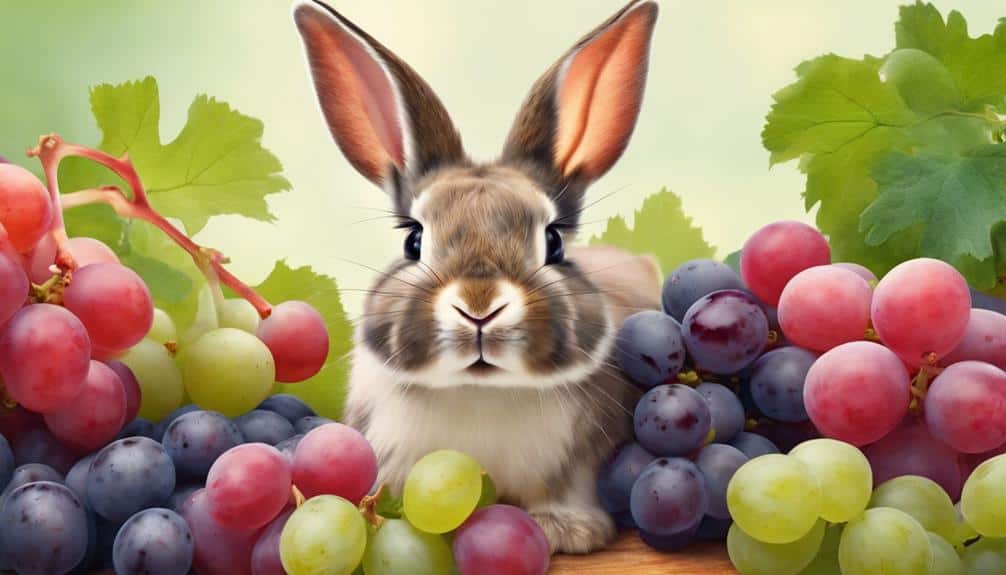
When considering the safety of grapes for bunnies, it's essential to be mindful of their high sugar content and potential risks associated with consumption. While rabbits enjoy the sweet taste of grapes, their digestive systems are sensitive, making moderation vital.
Rabbits eat a diet primarily consisting of hay, vegetables, and pellets. Introducing grapes gradually allows you to monitor any adverse reactions. However, it is essential to highlight that grape seeds can pose a choking hazard to bunnies, so it's best to remove them before feeding.
Limiting grape intake is advised to prevent digestive issues like bloating and diarrhea in rabbits. If your bunny shows signs of discomfort after consuming grapes, such as unusual lethargy or GI disturbances, consult a veterinarian promptly.
Grape Parts Safe for Bunnies
For bunnies, the flesh of grapes is a safe and nutritious part of their diet, providing them with essential vitamins and hydration. When offering grapes to your bunny, opt for seedless varieties to guarantee any choking hazards.
It's recommended to wash grapes thoroughly before serving them to your furry friend to remove any pesticides or residues that could harm them. Choosing organic grapes can also contribute to a healthier diet for your bunny by avoiding harmful chemicals.
To secure safe consumption, consider cutting grapes into smaller, bite-sized pieces for your bunny to enjoy without any risk. By following these simple steps and precautions, you can incorporate grapes into your bunny's diet safely and provide them with a tasty treat that they'll surely appreciate.
Grapes' Benefits for Bunnies
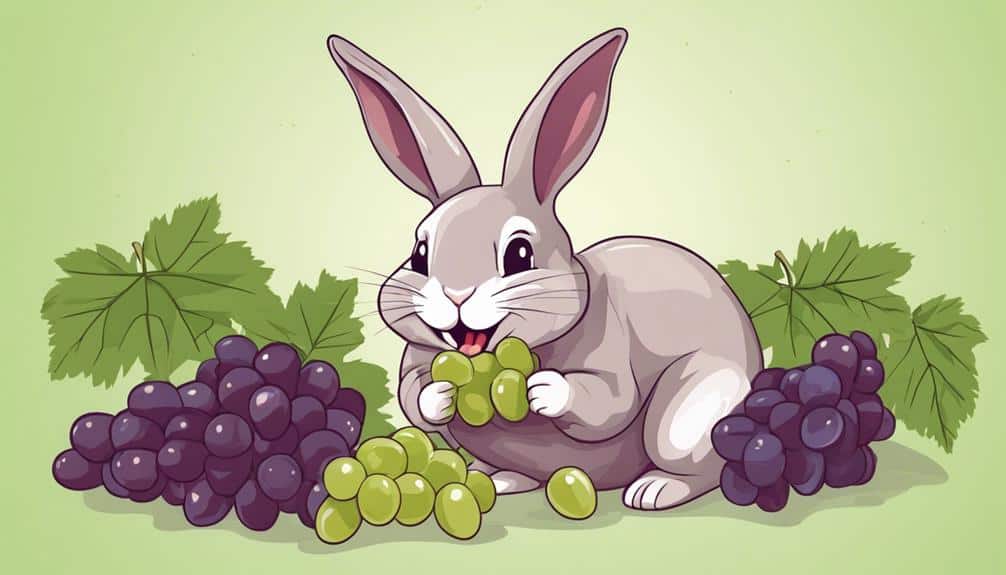
Grapes offer essential nutrients beneficial for rabbits, including antioxidants, vitamins, and minerals. These fruits are not only tasty but also provide vitamin C, potassium, and fiber, which are crucial for your bunny's health. Additionally, the high water content in grapes helps keep rabbits hydrated, supporting their overall well-being. When feeding grapes to your furry friend, remember to do so in moderation. While grapes are nutritious, their high sugar content means they should be a treat rather than a staple in their diet. Overindulgence can lead to obesity and diabetes in rabbits. Both red and green grapes are safe options for your bunny, and if you choose to offer raisins, do so sparingly as a special reward. To emphasize the benefits of feeding grapes to your rabbit, consider the following table:
| Nutrient | Benefit | Source |
|---|---|---|
| Antioxidants | Fight cell damage | Grapes |
| Vitamin C | Boosts immune system | Grapes |
| Potassium | Supports heart function | Grapes |
Quantity of Grapes for Bunnies
When feeding your bunny grapes, it's important to stick to recommended quantities to prevent potential health risks. Offering 1-3 grapes as a treat per serving and limiting these snacks to once a week or up to three times a month helps maintain your bunny's well-being.
Moderation in grape consumption is essential to prevent overeating and guarantee a balanced diet for your furry friend.
Safe Grape Amount
Limiting the quantity of grapes given to bunnies is essential to maintain their digestive health and overall well-being. When considering the safe grape amount for your beloved rabbit, keep the following points in mind:
- Adult bunnies can safely consume 2-3 small grapes or 1 large grape as a treat.
- Limiting grape intake is vital to prevent digestive discomfort in bunnies.
- Monitoring the rabbit's preference and reactions to grapes is important.
- Gradually introducing grapes into the diet can help assess tolerance.
Potential Health Risks
To maintain your bunny's digestive health and overall well-being, it's important to be mindful of the quantity of grapes they consume to prevent potential health risks.
Bunnies should only have 2-3 small grapes or 1 large grape to avoid discomfort due to the high sugar content in grapes. Excessive grape consumption can result in digestive issues like gas and bloating in bunnies, especially in adult rabbits.
It's essential to introduce grapes gradually into your bunny's diet and monitor their preference and reactions closely. By limiting the amount of grapes given to your bunny, you can help prevent any potential health issues associated with their consumption, ensuring a happy and healthy pet.
Preparing Grapes for Bunnies
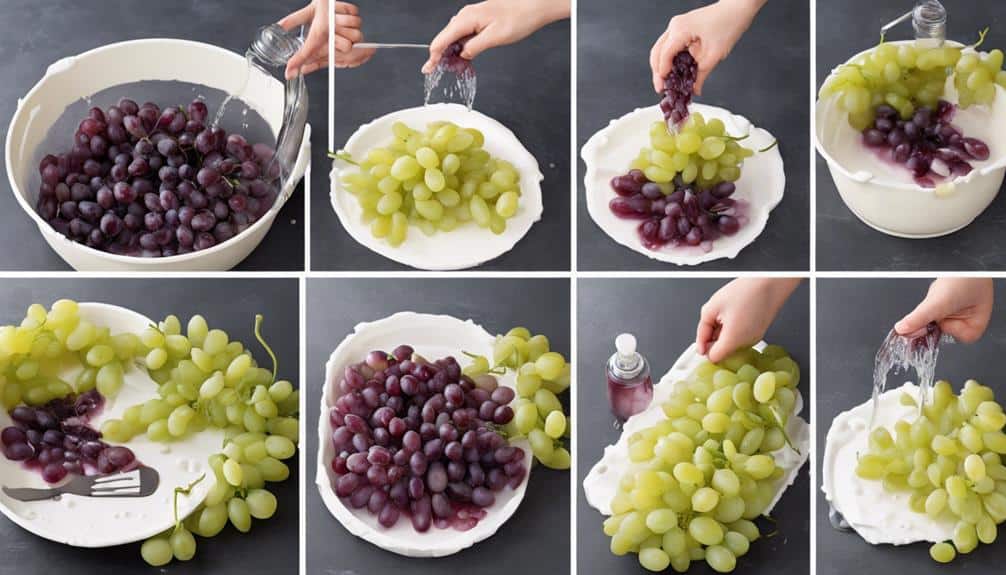
For bunnies, ensuring grapes are washed thoroughly is essential to remove any potential contaminants before serving. When preparing grapes for your bunny, consider the following tips:
- Wash Thoroughly: Rinse grapes under running water to eliminate any pesticides, dirt, or residue that may be harmful to your bunny.
- Cut into Small Pieces: Cutting grapes into smaller, bite-sized pieces can help prevent choking hazards and make it easier for your bunny to enjoy this sweet treat.
- Opt for Seedless: Choosing seedless grapes reduces the risk of seeds causing digestive issues for your furry friend.
- Consider Organic: Selecting organic grapes can lower the exposure to pesticides and chemicals, promoting a healthier snack option for your bunny.
Grape Overconsumption Symptoms in Bunnies
If your bunny consumes an excessive amount of grapes, watch out for symptoms like gas, bloating, or diarrhea, indicating potential digestive issues. Their delicate digestive systems can struggle with the high sugar levels found in grapes, possibly leading to obesity and diabetes if overeaten.
If you notice any signs of overconsumption, it's important to seek veterinary care promptly to prevent further health complications.
Excessive Grape Consumption
Excessive grape consumption by bunnies can lead to gastrointestinal issues such as gas, bloating, and diarrhea due to their sensitive digestive systems. To prevent digestive distress and other health problems, it's important to manage the intake of grapes in their diet. Here are some key points to take into account:
- High Sugar Content: Grapes contain high levels of natural sugars that can cause digestive upset if consumed excessively.
- Digestive Distress: Overeating grapes can lead to stomach discomfort and diarrhea in bunnies.
- Controlled Grape Intake: Moderation is key to avoiding obesity and diabetes in rabbits.
- Veterinary Care: If your bunny shows signs of digestive issues from grape overconsumption, seek guidance from a veterinarian for proper treatment.
Potential Health Risks
The potential health risks associated with overconsumption of grapes by bunnies include gastrointestinal issues such as gas, bloating, and diarrhea due to their sensitive digestive systems. Bunnies have delicate digestive systems that may struggle to process the high sugar content present in grapes, leading to these digestive problems.
Excessive intake of grapes can also contribute to obesity and diabetes in bunnies, further emphasizing the importance of controlled grape consumption. If you notice any symptoms of digestive distress after your bunny has eaten a large amount of grapes, it's advisable to seek veterinary care promptly.
Ensuring a balanced diet for your bunny and limiting grape intake are vital steps to prevent potential health issues and maintain your bunny's well-being.
Nutritional Value of Grapes for Bunnies
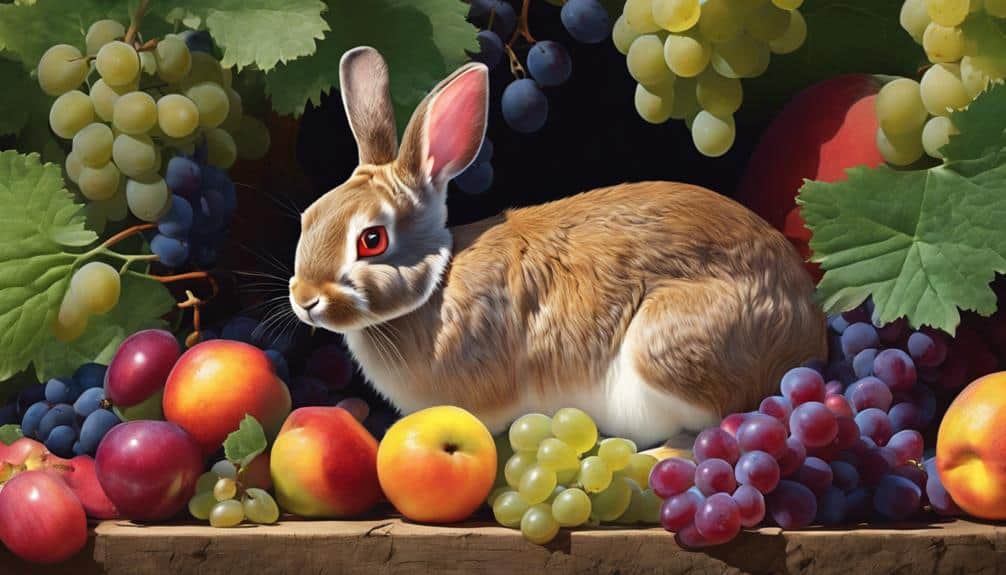
When considering the nutritional value of grapes for bunnies, moderation is key to preventing potential health risks associated with their high sugar content. Grapes offer essential vitamins and minerals beneficial to your bunny's health in moderation. Here's a breakdown of the nutritional value of grapes for your furry friend:
- Vitamins and Minerals: Grapes contain essential nutrients like Vitamin C and Vitamin K, which support your bunny's overall health.
- Health Benefits: The antioxidants present in grapes can help boost your bunny's immune system and promote overall well-being.
- Digestive Issues: While the fiber content in grapes can aid digestion, overconsumption can lead to digestive discomfort in bunnies.
- Hydration: With high water content, grapes can help keep your bunny hydrated, but remember, too much can cause health issues due to the sugar content.
Risks of Grapes for Bunnies
To understand the potential risks grapes pose for your bunny, consider their high sugar content and its implications for your pet's health. Grapes are high in sugar, with 15 grams per grape, which can lead to obesity and diabetes in rabbits. The sugar content in grapes can also cause digestive issues like gas, bloating, and diarrhea if consumed in excess. Additionally, grape seeds can pose a choking hazard for bunnies, emphasizing the importance of opting for seedless grapes when offering them as a treat. Overconsumption of grapes by rabbits may result in discomfort symptoms like digestive distress, necessitating veterinary attention. To prevent health issues related to high sugar content, it's essential to monitor your bunny's grape intake and limit it to 2-3 grapes 2-3 times a week.
| Risks of Grapes for Bunnies | |
|---|---|
| High Sugar Content | Obesity and diabetes risks |
| Digestive Issues | Gas, bloating, diarrhea |
| Choking Hazard | Grape seeds for bunnies |
| Overconsumption Effects | Digestive distress, vet visit |
| Moderation is Key | 2-3 grapes 2-3 times a week |
Healthy Alternatives to Grapes for Bunnies
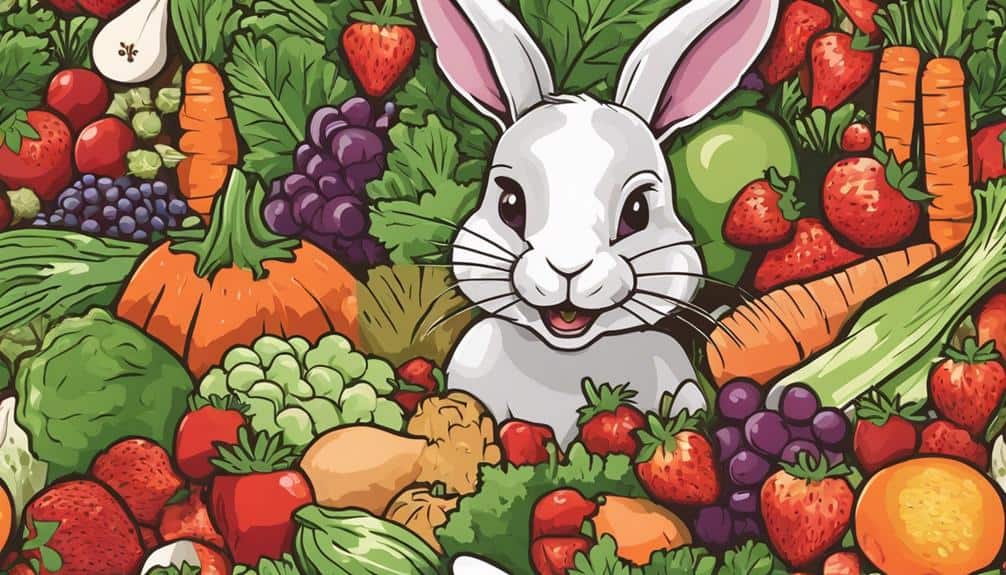
Consider incorporating a variety of nutrient-rich fruits like strawberries, apples, and blueberries as healthy alternatives to grapes for your bunny's diet. These fruits provide essential nutrients and can be given as occasional treats in moderation. Here are some reasons why these fruits can be beneficial for your bunny:
- Apples: Rich in fiber and vitamin C, apples can aid in digestion and boost the immune system of your bunny.
- Blueberries: Offering antioxidants and vitamin K, blueberries can support overall health and help in maintaining a healthy cardiovascular system for your bunny.
- Strawberries: A good source of vitamin C and manganese, strawberries can contribute to the overall well-being of your bunny.
- Variety: Rotate these fruit options to provide a diverse range of nutrients, prevent potential sensitivities, and keep your bunny interested in their diet.
Is It Safe for Bunnies to Eat Grapes If They Also Chew on Cardboard?
Yes, it is safe for bunnies to eat grapes even if they also indulge in their cardboard chewing habits. However, moderation is key. While grapes are a sweet treat for bunnies, they should only be given in small amounts to avoid any potential digestive issues.
Frequently Asked Questions
Are Grapes OK for Rabbits to Eat?
Yes, grapes are safe for rabbits in moderation. They offer nutritional benefits like fiber and vitamins. Stick to proper serving sizes, 1-3 grapes as an occasional treat per week. Overeating can cause digestive issues.
What Foods Can Rabbits Not Eat?
When it comes to keeping your bunny safe and healthy, it's essential to steer clear of toxic plants, dangerous foods, and potential health risks. Avoid items like avocado, onions, garlic, chocolate, rhubarb, and iceberg lettuce.
Can Bunnies Eat Bananas?
Bunnies can eat bananas as part of their diet. Offer them as occasional fruit treats due to their nutritional value, including vitamins and fiber. Introduce slowly and in small amounts to avoid digestive issues.
Can Bunnies Eat Cucumbers?
Cucumbers are safe for rabbits, offering hydration benefits and low calories. Introduce slowly to monitor digestion. Remove seeds to prevent choking. Limit treats to a few slices a couple times a week for digestive health.
Conclusion
To sum up, remember that bunnies can enjoy grapes as a delicious and nutritious treat, but moderation is key.
Picture your fluffy companion nibbling on a juicy grape, savoring the sweetness and benefiting from the vitamins and minerals it provides.
Treat your bunny to a few grapes now and then, but always be mindful of portion sizes to keep them happy and healthy.
Enjoy watching your bunny enjoy this special treat!

